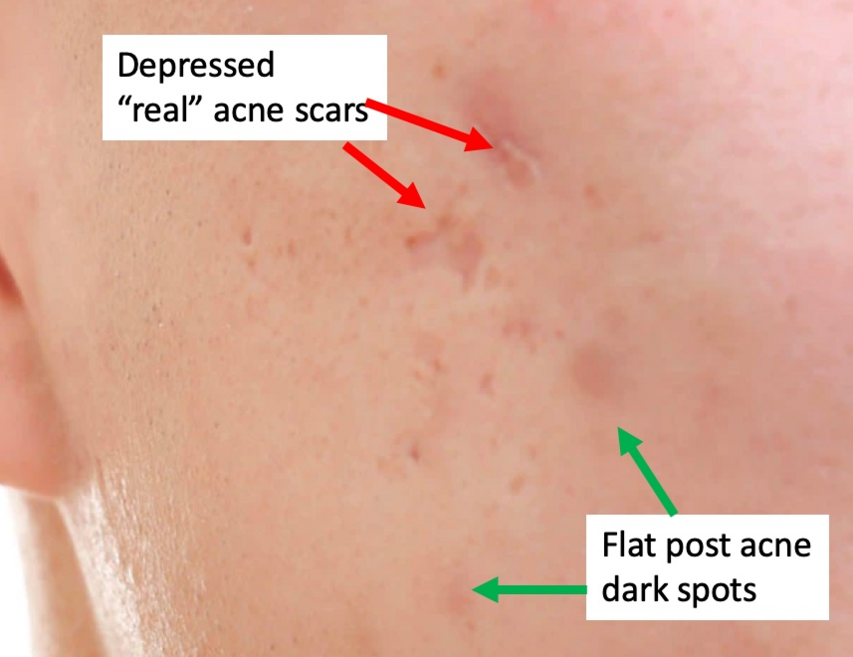Best non-surgical treatment for acne scars - according to dermatologists.
There are two main types of acne scars. Physical scars that can be felt with the hand and pigmented flat spots are color changes. The most common physical scars will look like depressions in your skin or deep holes, also called ice-pick scars.

Best Treatments for Flat Hyperpigmented Acne Scars
Hyperpigmentation from acne often manifests as flat, dark spots on the skin. Here’s how you can effectively treat them:
Step 1: Use Oil-Free Sunscreen
A good sunscreen is the foundation of hyperpigmentation treatment. An SPF 30 sunscreen is optimal, as higher SPFs may contain more chemicals, increasing the risk of irritation or allergies. Regular sunscreen use prevents dark spots from worsening due to UV exposure.
Step 2: Apply a Dark Spot Remover
Look for skin-brightening ingredients like:
- Hydroquinone: Widely available in the USA, it inhibits melanin production, effectively lightening dark spots.
- Arbutin: A safer, natural alternative to hydroquinone, commonly used outside the USA. It converts into hydroquinone in the skin and works synergistically with other brightening agents to fade hyperpigmentation.
Best Surgical Treatments for Physical Acne Scars
Physical acne scars, such as rolling or boxcar scars, often require more intensive treatments. The most effective surgical options include:
- Collagen Fiber Cutting (Undermining): A dermatologist performs this procedure to sever the fibrous bands beneath depressed scars, allowing the skin to lift and smooth out.
- Microneedle Radiofrequency: A minimally invasive technique that combines microneedling with radiofrequency energy to stimulate collagen production and improve skin texture. This method can significantly smooth bumpy or scarred skin.
For professional advice on surgical treatments, consult a board-certified dermatologist.
Best Non-Surgical Treatments for Physical Acne Scars
Non-surgical options can also yield significant improvements:
1. Retinol
Retinol is the most effective topical treatment for textured scars. Benefits include:
- Exfoliation: Retinol gradually exfoliates the skin, renewing the epidermis for a brighter appearance.
- Collagen Production: It penetrates the dermis to stimulate collagen, reducing the depth and visibility of depressed scars.
- Reduced Irritation: When combined with niacinamide and dimethicone, high-quality retinol minimizes redness and irritation.
Consistent use for at least six months is essential for visible results. Learn more about retinol treatments designed for sensitive or acne-prone skin.
2. Peptide and Ceramide Scar Creams
Topical creams with peptides and ceramides promote healing, reduce inflammation, and strengthen the skin barrier. These are especially effective for newer scars, improving skin texture and elasticity.
Exfoliation for Depressed Acne Scars
Physical exfoliation (e.g., scrubs, electric spin brushes) can damage the skin barrier, exacerbating scars and acne. Instead, use chemical exfoliation with:
- Retinol: Provides mild, invisible exfoliation while promoting collagen production for smoother skin. A concentration of 0.25%-0.5% is ideal for beginners.
- AHAs and BHAs: Alpha Hydroxy Acids (e.g., glycolic acid) and Beta Hydroxy Acids (e.g., salicylic acid) effectively peel the upper layers of the skin but don’t penetrate deeply to stimulate collagen as retinol does.
For a smoother, glowing complexion, incorporate retinol and AHA/BHA products into your skincare routine.
Silicone-Based Treatments for Scars
- Silicone Sheets: Effective for hypertrophic (raised) scars but less so for depressed scars.
- Dimethicone: A silicone-based polymer found in high-end moisturizers, dimethicone hydrates the skin and helps reduce the appearance of depressed scars when combined with peptides, ceramides, and other active ingredients.
For a comprehensive approach, consider creams containing dimethicone for smoother, healthier-looking skin.
Conclusion
Treating acne scars and hyperpigmentation requires a multi-faceted approach, including sunscreen, topical treatments, and advanced dermatological procedures. For hyperpigmented scars, prioritize sunscreen and dark spot removers. For physical scars, retinol and peptide creams offer non-surgical benefits, while microneedling and collagen fiber cutting are effective surgical options.
Shop:
Peptide Scar Cream
Retinol + Niacinamide Treatment Cream
References:
- Goodman GJ, Baron JA. Post acne scarring: a qualitative global scarring grading system. Dermatol Surg. 2006;32(12):1458-1466.
- Layton AM. Optimal management of acne to prevent scarring and psychological sequelae. Am J Clin Dermatol. 2011;12(5):283-294.
- Fabbrocini G, Annunziata MC, D'Arco V, et al. Acne scars: pathogenesis, classification, and treatment. Dermatol Res Pract. 2010;2010:893080.
To find the right acne treatments for your unique skin, take the free skin assessment by clicking here.



